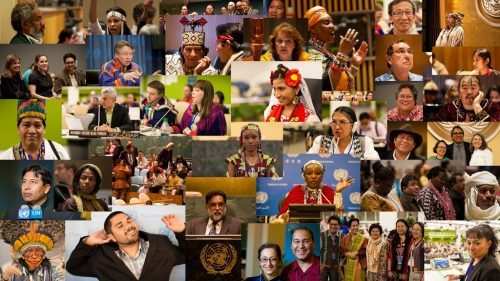Save the Earth- Respect Indigenous People of the World
Indigenous Peoples inhabit large areas of the Earth’s surface. Spread across the world from the Arctic to the South Pacific, they number nearly 370 million. Indigenous or aboriginal peoples are so called because they were living on their lands before settlers came from elsewhere; they are the descendents of those who inhabited a country or a geographical region at the time when people of different cultures or ethnic origin arrived, the new arrivals later became dominant through conquest, occupation, settlement or other means.

Indigenous Peoples inhabit large areas of the Earth’s surface. Spread across the world from the Arctic to the South Pacific, they number nearly 370 million. Indigenous or aboriginal peoples are so called because they were living on their lands before settlers came from elsewhere; they are the descendents of those who inhabited a country or a geographical region at the time when people of different cultures or ethnic origin arrived, the new arrivals later became dominant through conquest, occupation, settlement or other means.
UN General Assembly announced 9th August as International Day of the World’s Indigenous Peoples in 1994.The decade 1995-2004 was declared as the first decade of the indigenous people. The decade 2005-2015 was declared as the second decade of the World’s indigenous people
The indigenous Peoples have been subjected to denial, exclusion and placelessness. Denial, as conceptualized by Staneley Cohen, is the process whereby atrocities are neutralized ,normalized, legitimized or rendered invisible by being blocked out of consciousness and conscience. Such denial involves denial of knowledge, denial of feeling, denial of responsibility, and /or inaction in the light of knowledge. Acknowledgement, the first step towards remediation of atrocities, involves cognition, emotion, morality and action. Action requires that we know, remember, rescue, and do justice. Official, historical and cultural modes of denial are manifest at the organizational level and imbricate into the state order.
Indigenous peoples’ traditional knowledge and traditional cultural expressions embody significant innovation and embody significant innovation and creativity and contribute to the diversity of our planet’s civilisations and cultures. They also contribute to the cultural identity, sustainable development and social cohesion of indigenous peoples and local communities and globally to the conservation of the environment, the promotion of food security and the advancement of public health. The enhanced promotion, preservation and traditional cultural expressions are called for by indigenous peoples and local communities, who seek greater control and how these are accessed and used outside the traditional context
Indigenous peoples and local communities have therefore, a direct stake in the negotiations underway at the World Intellectual Property Organisation (WIPO) with the objective of reaching agreement on an international legal instrument or instruments which will ensure the effective protection of traditional knowledge and traditional cultural expressions. The negotiations also address the relationship between intellectual property and genetic resources, another issue of seminal interest and importance for indigenous peoples.
According to Atlas of the World’s Languages in Danger published by UNESCO in 2009 ,out of the 6000 existing languages, more than 200 have become extinct,538 are critically endangered,502 are severely endangered,632 are definitely endangered and 607 are unsafe. Of these 90 percent languages are indigenous languages. India has the largest number of endangered languages.
The indigenous population in India is around 8.2 percent of the total population. The indigenous people in India are called Tribes. In Rajasthan there are about twelve major tribes. South Rajasthan has about 52 percent tribal population. They also suffer from the menace of displacement and cultural homogenization as their counterparts in the rest of the world. The need therefore, is to device a localized , nature-based policy of development for the world which acknowledges the life-style and knowledge of the indigenous communities.
Contributed by: Dr. H.S. ChandaliyaTo join us on Facebook Click Here and Subscribe to UdaipurTimes Broadcast channels on GoogleNews | Telegram | Signal


